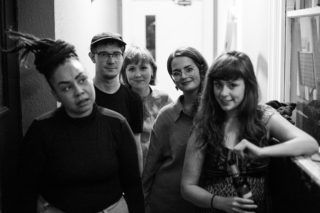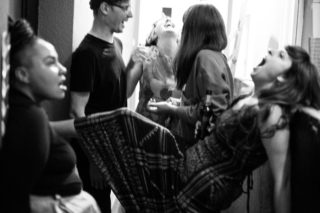Dorcha – five introverts throw shit into a blender
And come out with songs about being the weird, insular person in social situations

And come out with songs about being the weird, insular person in social situations
Rarely considered as easy listening, to describe music as ‘experimental’ conjures an intimidating image. “It’s a shit word really,” shrugs Anna Palmer, bassist and lead singer of Birmingham’s Dorcha. “It’s easy to make negative assumptions on what experimental music sounds like before you’ve even heard it. I’d much rather just say we sound ‘a bit off’.” Perhaps she’s being modest, but such a throwaway description falls considerably short. Exploring a maze of multidimensional capabilities, Dorcha’s entirely genre-fluid approach to making music is determined to remain uncategorised by any usual convention. “We use genre as expression more than anything,” she continues. “We just throw a lot of shit into a blender and see what comes out.”
For a band of self-confessed introverts, Dorcha seem like a chipper bunch. Even confined to the tiny webcam squares on my computer screen, Anna and fellow bandmates are struggling to keep straight faces with one another as they ridicule their shared social awkwardness. “This is nothing new for us,” jokes Anna nodding at lockdown restrictions. “We’ve all been social distancing for years,” she says laughing. Though it’s taken the best part of three years, the band’s imminent debut album, Honey Badger, celebrates those of us on the outside looking in. The anxious oddballs whose restless minds race and trip over themselves to flee unfamiliar surroundings. “It’s about capturing the chaos and introverted mayhem that transpires from being a weird insular person in social situations, but also how these circumstances might help you go on to develop and grow,” explains Anna. Clearly, Dorcha know this all too well. Each of them nodding, the band’s violist, Beth Bellis agrees: “We definitely blag it quite well, but in reality, we’re just a bunch of weirdos who are all equally insular and anxious a lot of the time.”
These twitching insecurities seep through the album’s conceptual backdrop. Loosely described as a coming together of people, Honey Badger imagines a minefield of conflicting personalities all too resembling of real-life situations. Whether it’s awkward party introductions or sterile office small talk, it’s a scene made purposefully uncomfortable with no clear route of escape. Each track forms a steppingstone or the next phase of a precariously laid-out path. As impatient hands usher you further along, sheepish encounters develop into wilder, more adventurous outbreaks. As Anna puts it, “the Honey Badger is the creeping presence within our psyches that unleashes the weird, socially unacceptable side.” However, conscious not to give too much away, she’s quick to elaborate: “I don’t necessarily agree with what everything is meant to mean. I want people to take away their own interpretations. We don’t want anyone thinking we’re taking this too seriously. Some of the lyrics are total fucking nonsense. It’s more about embracing the joyful, chaotic side of things.”

For a while, the band reminisce over their child-like excitement at first being introduced to the monster synthesisers inside Geoff Barrow’s Invada Studios. Having been offered the space to record the album, their first encounter with the acclaimed Portishead and BEAK> musician had gone down far smoother than expected, despite the fact no one actually recognised him. “I was completely oblivious the entire time, laughs Beth. “I had a huge chat with him and just thought he was some really lovely sound tech guy.” Adamant being blissfully unaware had prevented any obsessive fangirling, the look of awe on each face is enough to appreciate the high level of regard the band hold him in.
Such a kitted-out space as Invada allowed Dorcha a chance to flourish and really reinforce the foundations of everything they’d worked so tirelessly to create.
“All the music felt really different at the beginning,” recalls drummer Euan Palmer. “But eventually one track started to inform another until something entirely new was born. That’s a good enough reason not to have a genre fixated in your head.” He’s referring to Dorcha’s no holds barred mantra of stylistic free-for-all. Impossibly difficult to place, the band’s refusal to be pigeonholed is a pastiche of everything. It’s sort of paradoxical that so many reference points can culminate to such extremes of authenticity.
“Anyone who’s heard our music knows that each thing we’ve put out has sounded quite different,” says Beth. “To be so unpredictable is an advantage, rather than being tied down any fixed expectations.” It’s a fearless sentiment and with no two tracks on Honey Badger remotely the same, it’s a pledge Dorcha make with considerable intent. Hoping to challenge listeners, Anna speculates, “On the album, there’s quite a bit people can latch onto that might only be exclusive to one song. We like that the breadth of what we do can cause somebody to really love one track but might not be totally into the rest of it.”
Combining music with other mediums has always filled the centre of Dorcha’s creative process, and whilst the prospect of returning to gig venues remains depressingly unlikely, visual art has evolved to recreate the live experience through other, more inventive means. A piercing live energy thrives within Honey Badger, and despite weeks of preparation to road test the album, the band were left stranded by pandemic restrictions, unsure of where to redirect their efforts. “With live shows suddenly not possible, we twisted our plans into a visual representation of the album instead, so we have something interesting to show off without the gigs to back it up,” explains Anna. She’s referring to a feature-length film Dorcha are putting out concurrently with the album’s release in November on Box Records. A free flow of visuals to compliment the music’s wider composition, it’s a resourceful showcase to replace what could’ve been a defining inaugural performance.
“We didn’t want to influence anyone’s judgement or vision for what the album should feel like,” says Beth. “We were interested in people’s natural reaction to it rather than dictating the ideas ourselves.” With the help of a few independent collaborators, the film captures a host of candid interpretations, each seized and patchworked together to fill in a more complete picture. “It’s interesting because although each visual artist we worked with brings their own style and ideas to the table, it’s easy to spot certain aspects that are consistent throughout,” says Anna. “It’s funny how different minds working separately from one another can end up feeling so coherent.”
For bands like Dorcha, getting back to live music couldn’t come soon enough. Having not played together since November of last year, to crave the thrill of a live audience seems almost trivial after being deprived of jamming with friends for so long. Even through the faint crackle of my computer microphone the longing in Euan’s voice is palpable. “I think when that does happen, it’s going to be majorly special. Music changes when you hear it live. It’s never quite the same as on the record. For bands like us, it’s how we’ve built our music. By responding to the audience or our own energy levels, we create new shapes every time we play. It’s deeply personal and an integral part of socialising for a musician. I just can’t wait to play again.”
Photography by Sam Wood